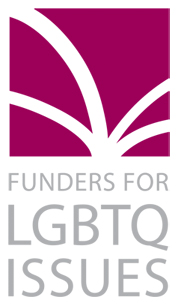Please read this statement issued by our partner Funders for LGBTQ Issues on 4/2/15.
INDIANA & ANTI-LGBT DISCRIMINATION: WHAT DOES IT MEAN FOR FOUNDATIONS?
Written by Ben Francisco Maulbeck
This past week, the eyes of the nation have turned to Indiana, where Governor Mike Pence recently signed a bill purportedly intended to protect religious freedom. In reality, the bill was crafted and advanced by individuals who want to pull back our recent progress toward equality for lesbian, gay, bisexual, and transgender (LGBT) people. The language of “religious freedom” is a smokescreen to allow people and businesses to discriminate against LGBT people.
Unfortunately, this problem is not limited to Indiana. As of this writing, a similar bill is advancing in Arkansas, and “religious freedom restoration” bills are on the table in Michigan, Nevada, North Carolina, and Texas. Montana, West Virginia and Wyoming all considered such bills during their recently completed legislative sessions—but ultimately rejected them.
This new batch of “religious freedom” bills goes far beyond the religious freedoms already protected by the Constitution and the federal Religious Freedom Restoration Act. These proposed or new laws apply religious rights to corporations and say the law can be invoked in private lawsuits, not just where a government agency has taken action to impinge on someone’s religious beliefs. These dangerously vague bills could not only support discrimination against LGBT people, but also against people of color and, ironically, people of faith. Similar legislation has been used to erode the reproductive rights of women and families, and their access to basic healthcare.
Moreover, there is still no federal law to protect LGBT people from discrimination. Lesbian, gay and bisexual people can be fired, evicted, or denied service in 29 states simply because of their sexual orientation. Transgender people lack explicit statutory protections in 31 states.
The states where LGBT people lack basic protections—and where special religious exemptions are being proposed—are also the states where LGBT communities are the most under-resourced. Less than $112,000 in total foundation funding was devoted to supporting Indiana’s LGBT communities in 2013. That amounts to only 61 cents per LGBT adult in the state. LGBT communities in Arkansas received less than $25,000, or about 29 cents per LGBT adult. LGBT leaders in states like Indiana and Arkansas are working hard to meet the basic needs of LGBT communities while fighting anti-LGBT legislation—with minimal resources.
The controversy in Indiana has generated more heat than light. But basic equality and dignity for all shouldn’t be controversial. If you’re a funder concerned about diversity, equity, and inclusion, here are a few ways you can work to support LGBT communities in the face of this renewed attack on equality for all:
- Make sure that your own employment policies prohibit discrimination on the basis of sexual orientation and gender identity.
- Ask your grantees and vendors to include sexual orientation and gender identity in their nondiscrimination policies as well.
- Support LGBT community organizations, especially in states where protections for LGBT people are weakest—in the Midwest, the South, and the Mountain states. Depending on your foundation’s mission and focus, this could mean funding advocacy efforts and public awareness, or it could mean funding community centers and faith-based groups to help support LGBT people and make all spaces more accepting and welcoming of LGBT communities.
Discriminatory legislation such as that enacted in Indiana warrants a swift and decisive response from all sectors. As Dr. Robert Ross, President and CEO of The California Endowment, said so well earlier this week, “This form of legislation, and any similar types of legislation in other states, merit condemnation, criticism, and social action.” Those of us in the philanthropic community can do our part by modeling the change we hope to see in the world, and by making sure we deliver resources to the community leaders and organizations working to make sure that our country lives up to its aspirations of freedom, respect, and dignity for all.
Ben Francisco Maulbeck is the President of Funders for LGBTQ Issues. Funders for LGBTQ Issues seeks to mobilize philanthropic resources that enhance the well-being of lesbian, gay, bisexual, transgender and queer communities, promote equity, and advance racial, economic and gender justice.

